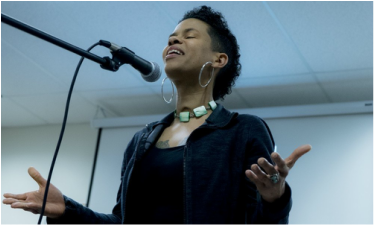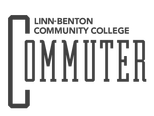- Christopher Trotchie with the Commuter
Turiya Autry recently headlined LBCC’s Unity Celebration. Held in the Fireside Room Wednesday, Feb. 26, she inspired a room full of strangers to raise their voices up together, celebrating the diversity our society has.
She challenged each person in the room to look at a bigger picture of life, one that includes not just our own vision, but one that attempts to illuminate the backdrop of our individual vantages of life with each other’s experiences, good and bad.
In this interview, Autry delves even deeper into her concepts in an attempt to offer one thing that seems to be slipping through the cracks of our society: Clarity.
What do events like the Unity Celebration mean to you?
When we come together and break bread, share in an inspiring event, recognize those who give back – we are building community. To do that with a desire to make the marginalized more visible and central, while embracing the entire community is powerful and necessary. To have unity we must have mutual love, appreciation and respect. In order to get to know each other across our differences, we have to make spaces and places for folks to interact with significant ideas and realities from a variety of angles, not just in a classroom setting. Fusing arts, history, and politics with poetics and appetizers is a win-win.
What is the key to successfully navigate through miscommunications?
Every situation and person is different. There is no one way to avoid miscommunication or navigate through it when it occurs. Here are some things that I find helpful:
I try to remember “unconditional positive regard.” Every person has a story and a perspective and is worthy of being seen and treated with positive regard, even when we don’t see them at their best selves. We do not know their path and future, or their entire history. We can’t change people, they have to change for themselves. We can’t enter into debate, conversations and interpersonal relationships, thinking that we can change people. We can give folks information and share our views, but people ultimately change for themselves, when and if they choose, on their own time. Listen for the meaning and intention of what people are saying, rather than judging and critiquing based solely on word choice and vocabulary. I see a lot of conversations shut down when a person uses a wrong term or isn’t as fluid in expressing their ideas. To encourage conversation we have to be open to hearing what people actually have to say without always leaping to the roles of judging and correcting. Once people feel attacked, they start to shut down. For people who are trying to be allies to marginalized folks, it is also really important to listen more, talk less, and do the work. There are libraries full of books and an internet full of resources; don’t expect the marginalized to be your encyclopedias and research database. When it comes to identity, dynamics and societal “isms,” there is a wealth of material out there. Read articles, watch some documentary videos, read some books, check out some art about it.
How do you think the United states is doing in regards to race relations?
Horrible. Unless you consider the true nature of the country and how it was built on ideas of supremacy, by very few over the masses. Race relations were about dominating, annihilating and exclusion; it is what the country was built on. The blood and bones of Native Americans, Black people, immigrants, the poor, and working class folks and otherwise exploited, are the foundation of the U.S. superpower status. In that sense, the country is right on track with its race relations. Five Hundred years of this specific brand of “race relations” has led to a pretty well run institution of inequity: see the One percent- five percent and their rising wealth versus everyone else, see the public lynching revival via police departments and neighbors with guns and chokeholds, see the wage/housing/employment/incarceration/achievement/wealth gaps.
“Race” is the elephant that’s been defecating in the room for 500 years, and folks want to burn a candle under some potpourri and act like everything’s good now, but we really don’t have time for that anymore.
She challenged each person in the room to look at a bigger picture of life, one that includes not just our own vision, but one that attempts to illuminate the backdrop of our individual vantages of life with each other’s experiences, good and bad.
In this interview, Autry delves even deeper into her concepts in an attempt to offer one thing that seems to be slipping through the cracks of our society: Clarity.
What do events like the Unity Celebration mean to you?
When we come together and break bread, share in an inspiring event, recognize those who give back – we are building community. To do that with a desire to make the marginalized more visible and central, while embracing the entire community is powerful and necessary. To have unity we must have mutual love, appreciation and respect. In order to get to know each other across our differences, we have to make spaces and places for folks to interact with significant ideas and realities from a variety of angles, not just in a classroom setting. Fusing arts, history, and politics with poetics and appetizers is a win-win.
What is the key to successfully navigate through miscommunications?
Every situation and person is different. There is no one way to avoid miscommunication or navigate through it when it occurs. Here are some things that I find helpful:
I try to remember “unconditional positive regard.” Every person has a story and a perspective and is worthy of being seen and treated with positive regard, even when we don’t see them at their best selves. We do not know their path and future, or their entire history. We can’t change people, they have to change for themselves. We can’t enter into debate, conversations and interpersonal relationships, thinking that we can change people. We can give folks information and share our views, but people ultimately change for themselves, when and if they choose, on their own time. Listen for the meaning and intention of what people are saying, rather than judging and critiquing based solely on word choice and vocabulary. I see a lot of conversations shut down when a person uses a wrong term or isn’t as fluid in expressing their ideas. To encourage conversation we have to be open to hearing what people actually have to say without always leaping to the roles of judging and correcting. Once people feel attacked, they start to shut down. For people who are trying to be allies to marginalized folks, it is also really important to listen more, talk less, and do the work. There are libraries full of books and an internet full of resources; don’t expect the marginalized to be your encyclopedias and research database. When it comes to identity, dynamics and societal “isms,” there is a wealth of material out there. Read articles, watch some documentary videos, read some books, check out some art about it.
How do you think the United states is doing in regards to race relations?
Horrible. Unless you consider the true nature of the country and how it was built on ideas of supremacy, by very few over the masses. Race relations were about dominating, annihilating and exclusion; it is what the country was built on. The blood and bones of Native Americans, Black people, immigrants, the poor, and working class folks and otherwise exploited, are the foundation of the U.S. superpower status. In that sense, the country is right on track with its race relations. Five Hundred years of this specific brand of “race relations” has led to a pretty well run institution of inequity: see the One percent- five percent and their rising wealth versus everyone else, see the public lynching revival via police departments and neighbors with guns and chokeholds, see the wage/housing/employment/incarceration/achievement/wealth gaps.
“Race” is the elephant that’s been defecating in the room for 500 years, and folks want to burn a candle under some potpourri and act like everything’s good now, but we really don’t have time for that anymore.

